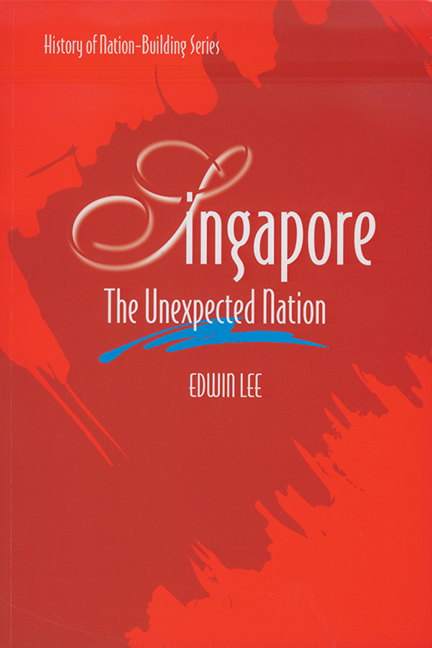Book contents
- Frontmatter
- Dedication
- Contents
- Preface
- Introduction by Wang Gungwu
- Chapter One Beginnings: From Temasek to Singapore
- Chapter Two Race, History and Nationalism
- Chapter Three Contestants and Contesting Visions
- Chapter Four The Accidental Chief Minister
- Chapter Five The Terminal Chief Minister
- Chapter Six The Embattled Prime Minister
- Chapter Seven Merger: Contesting Ownership and Principles
- Chapter Eight Terms of Disendearment
- Chapter Nine Dare to be Equal
- Chapter Ten The Way to Survive
- Chapter Eleven National Service: The Price of Independence
- Chapter Twelve Politics of Education
- Chapter Thirteen Home Ownership, National Stability and the New Middle Classes
- Chapter Fourteen University and Nation
- Chapter Fifteen Toh's Nation-Building Thrust
- Chapter Sixteen Nantah: Between Community and Nation
- Chapter Seventeen Self-Renewal: Talents for a Tough Act
- Chapter Eighteen The Consensual Prime Minister
- Chapter Nineteen Confucianism, Christianity, Chineseness
- Chapter Twenty Singapore Dreams, Singapore Dilemmas
- Chapter Twenty-One The Hyphenated Singaporean
- Chapter Twenty-Two The Unexpected Nation
- Bibliographical Note
- Index
- The Author
Chapter Twenty-Two - The Unexpected Nation
Published online by Cambridge University Press: 21 October 2015
- Frontmatter
- Dedication
- Contents
- Preface
- Introduction by Wang Gungwu
- Chapter One Beginnings: From Temasek to Singapore
- Chapter Two Race, History and Nationalism
- Chapter Three Contestants and Contesting Visions
- Chapter Four The Accidental Chief Minister
- Chapter Five The Terminal Chief Minister
- Chapter Six The Embattled Prime Minister
- Chapter Seven Merger: Contesting Ownership and Principles
- Chapter Eight Terms of Disendearment
- Chapter Nine Dare to be Equal
- Chapter Ten The Way to Survive
- Chapter Eleven National Service: The Price of Independence
- Chapter Twelve Politics of Education
- Chapter Thirteen Home Ownership, National Stability and the New Middle Classes
- Chapter Fourteen University and Nation
- Chapter Fifteen Toh's Nation-Building Thrust
- Chapter Sixteen Nantah: Between Community and Nation
- Chapter Seventeen Self-Renewal: Talents for a Tough Act
- Chapter Eighteen The Consensual Prime Minister
- Chapter Nineteen Confucianism, Christianity, Chineseness
- Chapter Twenty Singapore Dreams, Singapore Dilemmas
- Chapter Twenty-One The Hyphenated Singaporean
- Chapter Twenty-Two The Unexpected Nation
- Bibliographical Note
- Index
- The Author
Summary
Exit from Malaysia
Singapore arose as an independent nation from the wreckage of a dream for a greater political union. It was a dream that Lee Kuan Yew held all his young adult life. Lee desperately pursued and Tunku Abdul Rahman reluctantly agreed to the formation of Malaysia. They had a mutual foe: the communist network in Singapore which Lee could not destroy singlehandedly without incurring a heavy political price in his predominantly Chinese, communist-influenced, city state, and which the Tunku, on the other side of the causeway, found too close for comfort. But after Malaysia was formed, and the communist threat neutralized, the differences in the politics of the two prime ministers came irreconciliably to the fore.
The Tunku's politics was encapsulated in what has been called the historic bargain between the ethnic communities prior to merdeka in Malaya in 1957. The Tunku agreed to citizenship on jus soli for the Chinese and Indians (as from the independence date, and not earlier), but would not concede recognizing Chinese as an official language. Chinese leaders agreed to special rights for Malays stipulated as land reservations, and quotas in the public services, university admissions, government-awarded scholarships, and trade licences. These Malay special rights, together with Malay dominance in parliament and cabinet, attained, and never relinquished, before more non-Malays received citizenship and hence the vote, assured the Malays absolute control of politics and government in Malaya, and since 1963, in Malaysia.
“The Tunku's simple belief,” Lee said, “was that politics was for the Malays and business for the Chinese.” What it amounted to was that the Chinese businessman would be in a clientelist relationship with the Malay power-holder.
The dispute between Singapore and the central government came to a head when the PAP advocated a Malaysian Malaysia in which everyone, regardless of race, was equal. This resulted in Singapore's expulsion from Malaysia in 1965.
Younger Malay nationalists in the UMNO were no more satisfied than Lee was with the Tunku's politics, though for a completely different reason. They considered the Tunku too conciliatory towards the non-Malays, and did not go all out to implement Malay special rights, especially if doing so conflicted with Chinese and Indian middleman interests.
- Type
- Chapter
- Information
- SingaporeThe Unexpected Nation, pp. 633 - 666Publisher: ISEAS–Yusof Ishak InstitutePrint publication year: 2008

